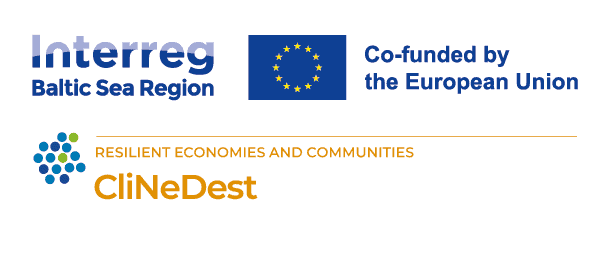
CliNeDest webinar empowered the way for climate-smart tourism business
23 September 2025
CliNeDest webinar “Shaping Climate-Smart Tourism Business” engaged 150 participants including national tourism organisations, destination management organisations, tourism business and local authorities from 15 countries. The fantastic webinar speakers were:
- Nicoleta Anca Matei, an economist who has served as a Climate Change Specialist at the FAO of the United Nations and as an Economic Policy Analyst at the European Commission’s Joint Research Centre (JRC).
- Jeremy Smith, co-founder of Tourism Declares a Climate Emergency and co-author of the Glasgow Declaration on Climate Action in Tourism.
- Marie Linde, initiator of “Stepping up Sustainability strategy” at the West Sweden Tourist board – a Swedish DMO.
- David Naraine, owner of Swedish Country Living®, combining business insight with a deep commitment to nature and meaningful living.
- Annika Koskenkorva, Project Manager of Climate Neutral Destinations at Visit Tampere.
See the summary and key messages of the webinar here: CliNeDest webinar summary
Nicoleta Anca Matei : “Climate change is already reshaping seasons, weather and visitor expectations”
How will climate change affect European tourism demand for various future global warming levels? Nicoleta Anca Matei shared the latest key insights from a major European Commission-Joint Research Centre study – with a clear takeaway: climate change isn’t just an environmental concern – it’s a critical matter for the tourism industry. According to the study, climate change affects EU regions unevenly, with a clear shift in tourism patterns. Mediterranean and Southern Europe are projected to face declines in tourist volumes, while Northern regions are expected to have an increase in number of tourists due to longer peak seasons and higher demand.
Jeremy Smith: “How can we break the barriers to climate action in tourism?”
Jeremy Smith helps destinations, businesses, and networks to move from commitments to meaningful action in tourism business. Since the launch of the Glasgow Declaration in 2021, more than 850 organisations worldwide have signed on, with hundreds publishing climate action plans. However, many organisations struggle already at the starting point of measurement. Jeremy pointed out that simple steps can guide companies toward identifying priorities without the need for complex systems. Beyond technical barriers, he especially underlined the emotional and psychological dimension of climate action. Climate anxiety is rising among both staff and customers, with many feeling powerless or overwhelmed. Businesses can support resilience by acknowledging these emotions, offering experiences that reconnect people with nature and slower ways of living. Tourism, Smith argued, has a unique role in helping people imagine and experience “other ways to live.” Destinations and businesses can act as living laboratories, showcasing sustainable practices and regenerative approaches. Storytelling and sharing examples of hope are vital in inspiring both employees and visitors.
Keynote: Breaking barriers to climate action in tourism
Marie Linde: “How can tourism contribute to broader climate goals in practice?”
The West Sweden Tourist board is a Swedish DMO that develops and markets the tourism industry in West Sweden. Their regional strategy Stepping up Sustainability guides the development of climate-smart and sustainable tourism. Stepping up Sustainability strategy covers all dimensions of sustainability and now involves all municipalities in the area and over 750 tourism companies. Fredrik and Marie Linde are the initiators of the strategy. One result of the strategy work is “climate-smart holidays” – low-emission holiday packages without compromising on the experience. The basic principles include being close to nature with causing almost zero carbon dioxide emissions. Climate-smart holidays favor small-scale family businesses where everything is sustainable, from accommodation, food and activities to transportation.
Case West Sweden: Climate smart holidays
David Naraine: “The future of tourism can be regenerative and create meaningful experiences for the travelers”
The webinar discussed the future of tourism and how to make the following vision true: “The journeys of tomorrow will be Slower, Greener and more Meaningful. Travelers will choose experiences that regenerate nature, empower communities, and leave a positive footprint.” David Naraine, owner of Swedish Country Living®, has really made the vision of sustainable tourism a reality. He has built a rural retreat that respects the nature in all aspects. It includes off-grid eco-cabins with circular water systems and opportunities for regenerative farming. Swedish Country Living is a true model for responsible tourism. Sustainability strengthens the identity of visitors, enhances guest satisfaction and creates unique and valuable experiences. This brings more income, and benefits the business, people and nature.
Company Case – Building a tourism business on climate-smart values
Annika Koskenkorva: “A key outcome of CliNeDest project will be a Climate Smart Business Toolkit.”
Annika Koskenkorva presented the aims and activities of the Climate Neutral Destinations (CliNeDest) project. The project aims to support companies in adopting climate-smart business practices through tools for measuring emissions, decarbonisation strategies, and co-creation of low-carbon visitor experiences. CliNeDest is a great platform for destinations to share experiences and seed hope for the work that aims to engage tourism companies, destinations and other tourism stakeholders to foster climate action in tourism business. Koskenkorva highlighted the value for participating companies: practical tools with expert support, improving climate resilience, networking opportunities, and increased visibility.
A key outcome will be a Climate Smart Business Toolkit, developed and tested with tourism companies. The toolkit will provide carbon calculation methods, guidance on integrating climate data into business development, and models for creating and marketing low-carbon experiences. In addition, a transnational Climate Neutral Destination Network will be established to ensure long-term cooperation beyond the project period.
Towards climate-smart tourism through Baltic Sea region cooperation





